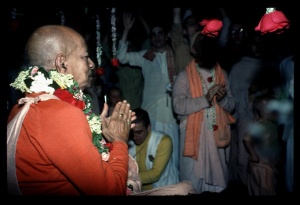SB 6.17.22: Difference between revisions
m (1 revision(s)) |
(Vanibot #0054 edit - transform synonyms into clickable links, which search similar occurrences) |
||
| (One intermediate revision by one other user not shown) | |||
| Line 1: | Line 1: | ||
{{info | {{info | ||
|speaker=King Citraketu | |speaker=King Citraketu | ||
|listener=Lord | |listener=Lord Śiva and Goddess Pārvatī | ||
}} | }} | ||
[[Category:Srimad-Bhagavatam - Canto 06 Chapter 17]] | |||
[[Category:Bhagavatam Verses Spoken by Citraketu Maharaja - Vanisource|061722]] | |||
<div style="float:left">'''[[Srimad-Bhagavatam]] - [[SB 6|Sixth Canto]] - [[SB 6.17: Mother Parvati Curses Citraketu|Chapter 17: Mother Pārvatī Curses Citraketu]]'''</div> | |||
<div style="float:right">[[File:Go-previous.png|link=SB 6.17.21]] '''[[SB 6.17.21]] - [[SB 6.17.23]]''' [[File:Go-next.png|link=SB 6.17.23]]</div> | |||
{{RandomImage}} | |||
==== TEXT 22 ==== | ==== TEXT 22 ==== | ||
<div class="verse"> | |||
<div | :na tasya kaścid dayitaḥ pratīpo | ||
na tasya kaścid dayitaḥ pratīpo | :na jñāti-bandhur na paro na ca svaḥ | ||
na jñāti-bandhur na paro na ca svaḥ | :samasya sarvatra nirañjanasya | ||
samasya sarvatra nirañjanasya | :sukhe na rāgaḥ kuta eva roṣaḥ | ||
sukhe na rāgaḥ kuta eva roṣaḥ | |||
</div> | </div> | ||
| Line 17: | Line 22: | ||
==== SYNONYMS ==== | ==== SYNONYMS ==== | ||
<div class="synonyms"> | |||
<div | ''[//vanipedia.org/wiki/Special:VaniSearch?s=na&tab=syno_o&ds=1 na]'' — not; ''[//vanipedia.org/wiki/Special:VaniSearch?s=tasya&tab=syno_o&ds=1 tasya]'' — of Him (the Supreme Lord); ''[//vanipedia.org/wiki/Special:VaniSearch?s=kaścit&tab=syno_o&ds=1 kaścit]'' — anyone; ''[//vanipedia.org/wiki/Special:VaniSearch?s=dayitaḥ&tab=syno_o&ds=1 dayitaḥ]'' — dear; ''[//vanipedia.org/wiki/Special:VaniSearch?s=pratīpaḥ&tab=syno_o&ds=1 pratīpaḥ]'' — not dear; ''[//vanipedia.org/wiki/Special:VaniSearch?s=na&tab=syno_o&ds=1 na]'' — nor; ''[//vanipedia.org/wiki/Special:VaniSearch?s=jñāti&tab=syno_o&ds=1 jñāti]'' — kinsman; ''[//vanipedia.org/wiki/Special:VaniSearch?s=bandhuḥ&tab=syno_o&ds=1 bandhuḥ]'' — friend; ''[//vanipedia.org/wiki/Special:VaniSearch?s=na&tab=syno_o&ds=1 na]'' — nor; ''[//vanipedia.org/wiki/Special:VaniSearch?s=paraḥ&tab=syno_o&ds=1 paraḥ]'' — other; ''[//vanipedia.org/wiki/Special:VaniSearch?s=na&tab=syno_o&ds=1 na]'' — nor; ''[//vanipedia.org/wiki/Special:VaniSearch?s=ca&tab=syno_o&ds=1 ca]'' — also; ''[//vanipedia.org/wiki/Special:VaniSearch?s=svaḥ&tab=syno_o&ds=1 svaḥ]'' — own; ''[//vanipedia.org/wiki/Special:VaniSearch?s=samasya&tab=syno_o&ds=1 samasya]'' — who is equal; ''[//vanipedia.org/wiki/Special:VaniSearch?s=sarvatra&tab=syno_o&ds=1 sarvatra]'' — everywhere; ''[//vanipedia.org/wiki/Special:VaniSearch?s=nirañjanasya&tab=syno_o&ds=1 nirañjanasya]'' — without being affected by material nature; ''[//vanipedia.org/wiki/Special:VaniSearch?s=sukhe&tab=syno_o&ds=1 sukhe]'' — in happiness; ''[//vanipedia.org/wiki/Special:VaniSearch?s=na&tab=syno_o&ds=1 na]'' — not; ''[//vanipedia.org/wiki/Special:VaniSearch?s=rāgaḥ&tab=syno_o&ds=1 rāgaḥ]'' — attachment; ''[//vanipedia.org/wiki/Special:VaniSearch?s=kutaḥ&tab=syno_o&ds=1 kutaḥ]'' — from where; ''[//vanipedia.org/wiki/Special:VaniSearch?s=eva&tab=syno_o&ds=1 eva]'' — indeed; ''[//vanipedia.org/wiki/Special:VaniSearch?s=roṣaḥ&tab=syno_o&ds=1 roṣaḥ]'' — anger. | ||
</div> | </div> | ||
| Line 25: | Line 29: | ||
==== TRANSLATION ==== | ==== TRANSLATION ==== | ||
<div class="translation"> | |||
<div | |||
The Supreme Personality of Godhead is equally disposed toward all living entities. Therefore no one is very dear to Him, and no one is a great enemy for Him; no one is His friend, and no one is His relative. Being unattached to the material world, He has no affection for so-called happiness or hatred for so-called distress. The two terms happiness and distress are relative. Since the Lord is always happy, for Him there is no question of distress. | The Supreme Personality of Godhead is equally disposed toward all living entities. Therefore no one is very dear to Him, and no one is a great enemy for Him; no one is His friend, and no one is His relative. Being unattached to the material world, He has no affection for so-called happiness or hatred for so-called distress. The two terms happiness and distress are relative. Since the Lord is always happy, for Him there is no question of distress. | ||
</div> | </div> | ||
__NOTOC__ | |||
<div style="float:right; clear:both;">[[File:Go-previous.png|link=SB 6.17.21]] '''[[SB 6.17.21]] - [[SB 6.17.23]]''' [[File:Go-next.png|link=SB 6.17.23]]</div> | |||
__NOTOC__ | |||
__NOEDITSECTION__ | |||
Latest revision as of 22:33, 18 February 2024

A.C. Bhaktivedanta Swami Prabhupada
TEXT 22
- na tasya kaścid dayitaḥ pratīpo
- na jñāti-bandhur na paro na ca svaḥ
- samasya sarvatra nirañjanasya
- sukhe na rāgaḥ kuta eva roṣaḥ
SYNONYMS
na — not; tasya — of Him (the Supreme Lord); kaścit — anyone; dayitaḥ — dear; pratīpaḥ — not dear; na — nor; jñāti — kinsman; bandhuḥ — friend; na — nor; paraḥ — other; na — nor; ca — also; svaḥ — own; samasya — who is equal; sarvatra — everywhere; nirañjanasya — without being affected by material nature; sukhe — in happiness; na — not; rāgaḥ — attachment; kutaḥ — from where; eva — indeed; roṣaḥ — anger.
TRANSLATION
The Supreme Personality of Godhead is equally disposed toward all living entities. Therefore no one is very dear to Him, and no one is a great enemy for Him; no one is His friend, and no one is His relative. Being unattached to the material world, He has no affection for so-called happiness or hatred for so-called distress. The two terms happiness and distress are relative. Since the Lord is always happy, for Him there is no question of distress.